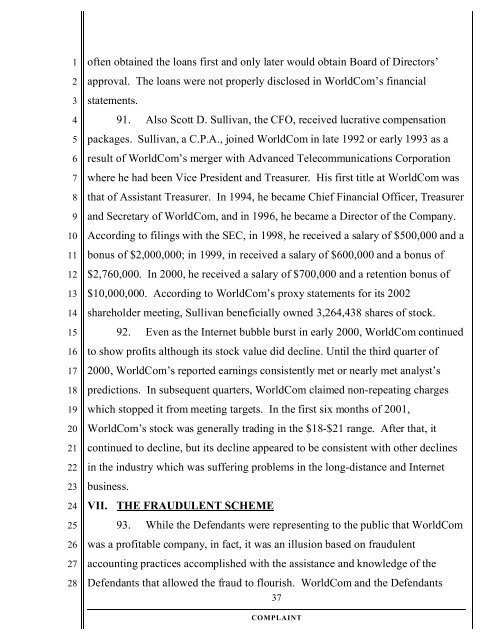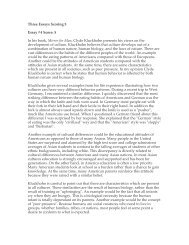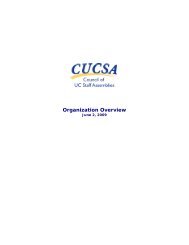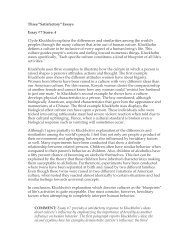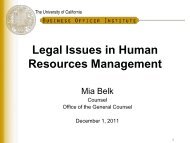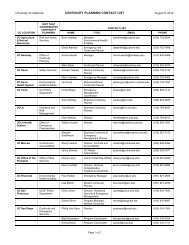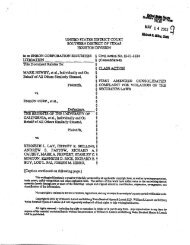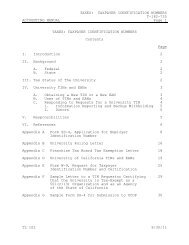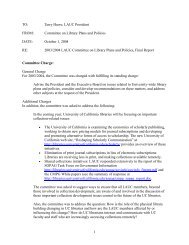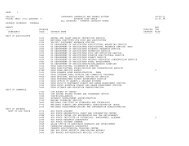The Regents - University of California | Office of The President
The Regents - University of California | Office of The President
The Regents - University of California | Office of The President
You also want an ePaper? Increase the reach of your titles
YUMPU automatically turns print PDFs into web optimized ePapers that Google loves.
1<br />
2<br />
3<br />
4<br />
5<br />
6<br />
7<br />
8<br />
9<br />
10<br />
11<br />
12<br />
13<br />
14<br />
15<br />
16<br />
17<br />
18<br />
19<br />
20<br />
21<br />
22<br />
23<br />
<strong>of</strong>ten obtained the loans first and only later would obtain Board <strong>of</strong> Directors’<br />
approval. <strong>The</strong> loans were not properly disclosed in WorldCom’s financial<br />
statements.<br />
91. Also Scott D. Sullivan, the CFO, received lucrative compensation<br />
packages. Sullivan, a C.P.A., joined WorldCom in late 1992 or early 1993 as a<br />
result <strong>of</strong> WorldCom’s merger with Advanced Telecommunications Corporation<br />
where he had been Vice <strong>President</strong> and Treasurer. His first title at WorldCom was<br />
that <strong>of</strong> Assistant Treasurer. In 1994, he became Chief Financial <strong>Office</strong>r, Treasurer<br />
and Secretary <strong>of</strong> WorldCom, and in 1996, he became a Director <strong>of</strong> the Company.<br />
According to filings with the SEC, in 1998, he received a salary <strong>of</strong> $500,000 and a<br />
bonus <strong>of</strong> $2,000,000; in 1999, in received a salary <strong>of</strong> $600,000 and a bonus <strong>of</strong><br />
$2,760,000. In 2000, he received a salary <strong>of</strong> $700,000 and a retention bonus <strong>of</strong><br />
$10,000,000. According to WorldCom’s proxy statements for its 2002<br />
shareholder meeting, Sullivan beneficially owned 3,264,438 shares <strong>of</strong> stock.<br />
92. Even as the Internet bubble burst in early 2000, WorldCom continued<br />
to show pr<strong>of</strong>its although its stock value did decline. Until the third quarter <strong>of</strong><br />
2000, WorldCom’s reported earnings consistently met or nearly met analyst’s<br />
predictions. In subsequent quarters, WorldCom claimed non-repeating charges<br />
which stopped it from meeting targets. In the first six months <strong>of</strong> 2001,<br />
WorldCom’s stock was generally trading in the $18-$21 range. After that, it<br />
continued to decline, but its decline appeared to be consistent with other declines<br />
in the industry which was suffering problems in the long-distance and Internet<br />
business.<br />
24<br />
25<br />
VII.<br />
THE FRAUDULENT SCHEME<br />
93. While the Defendants were representing to the public that WorldCom<br />
26<br />
27<br />
28<br />
was a pr<strong>of</strong>itable company, in fact, it was an illusion based on fraudulent<br />
accounting practices accomplished with the assistance and knowledge <strong>of</strong> the<br />
Defendants that allowed the fraud to flourish. WorldCom and the Defendants<br />
37<br />
COMPLAINT


